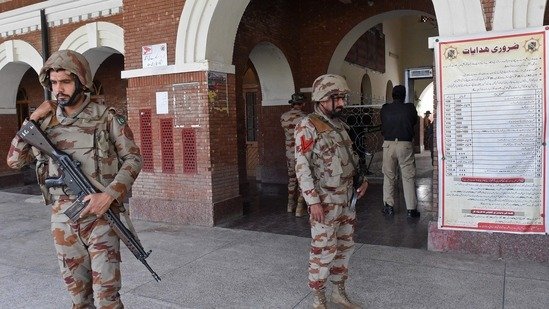India’s retaliatory strikes hit back at Pakistan’s shelling and drone attempts, causing major damage to its military infrastructure across the border areas.

(L-R) Air Marshal AK Bharti, DGMO Lieutenant General Rajiv Ghai and Vice Admiral AN Pramod during the press conference on Operation Sindoor, in New Delhi on Sunday. (ANI )
Director General of Air Operations, Air Marshal AK Bharti, on Monday confirmed that the Indian armed forces did not target the nuclear facility at Kirana Hills in Pakistan.
Responding to a query during a press conference on Monday, Bharti said, “Thank you for telling us that Kirana Hills houses some nuclear installation. We did not know about it. And we have not hit Kirana Hills, whatever is there.”
His remarks came amid speculation and social media chatter claiming that India had struck the Mushaf Airbase in Sargodha, reportedly linked to underground nuclear storage beneath the Kirana Hills, using loitering and penetrating munitions.
The Kirana Hills is a vast rocky mountain range and a designated area under Pakistan ministry of defence in Sargodha district. Locally referred to as the “Black Mountains” due to its brownish terrain, it stretches between the township of Rabwah and the city of Sargodha.
AK Bharti also highlighted the preparedness and performance of Indian forces during recent military operations. “Another highlight was the stellar performance of indigenous air defence weapons like the Akash system,” he said.
“All our military bases and systems continue to remain fully operational and ready to undertake any mission,” he added.
At a joint press briefing on Sunday, Air Marshal Bharti presented visual evidence of extensive damage to Pakistani air defence radars, airfields, and other military installations.
India’s retaliatory strikes followed Pakistan’s attempted targeting of 26 Indian locations, including air force bases in Udhampur, Pathankot, and Adampur, on the night of May 9–10.
The Indian response came under the codename ‘Operation Sindoor’, launched on May 7 in retaliation for the April 22 terror attack in Pahalgam, Jammu and Kashmir, which killed 26 people, mostly tourists.
India strikes nine terror hideouts in Pakistan, PoK
As part of Operation Sindoor, the Indian Air Force conducted precision night raids on nine terror hideouts across Pakistan and Pakistan-occupied Kashmir. The strikes targeted key infrastructure belonging to banned terror outfits including Jaish-e-Mohammed, Lashkar-e-Taiba, and Hizbul Mujahideen.
Among the precise targets hit were the Markaz Subhan Allah at Bahawalpur, Sarjal at Tehra Kalan, Markaz Abbas in Kotli, and Syedna Bilal camp in Muzaffarabad, all linked to the banned Jaish-e-Mohammed.
Other targets included the Markaz Taiba at Murdike, Markaz Ahle Hadith at Barnala, and Shwawai Nalla camp at Muzaffarabad, all associated with the banned Lashkar-e-Taiba.
Additionally, Makaz Raheel Shahid in Kotli and Mehmoona Joya in Sialkot, belonging to Hizbul Mujahideen, were also hit.
Of the nine targets, four were located in Pakistan and five in Pakistan-occupied-Kashmir.
Meanwhile, on Saturday, India and Pakistan announced a bilateral agreement to halt all firings and military operations across land, air, and sea, effective immediately.
The ceasefire announcement followed US-mediated talks, with President Donald Trump confirming that both nations had agreed to a “full and immediate” cessation of hostilities.
The officer remains in direct contact with counterparts in other countries to manage and de-escalate potential conflicts, as seen in the ongoing India-Pakistan tensions following the April 22 Pahalgam attack, according to a report in The Mint.
A DGMO is responsible for planning and overseeing military operations, including combat missions and counter-terrorism efforts. Ensuring that the armed forces remain prepared for any kind of operation is a key part of the job.





















